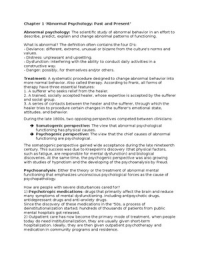Chapter 1 ‘Abnormal Psychology: Past and Present’
Abnormal psychology: The scientific study of abnormal behavior in an effort to
describe, predict, explain and change abnormal patterns of functioning.
What is abnormal? The definition often contains the four D's:
- Deviance: different, extreme, unusual or bizarre from the culture's norms and
values.
- Distress: unpleasant and upsetting.
- Dysfunction: interfering with the ability to conduct daily activities in a
constructive way.
- Danger: possibly, for themselves and/or others.
Treatment: A systematic procedure designed to change abnormal behavior into
more normal behavior. Also called therapy. According to Frank, all forms of
therapy have three essential features:
1. A sufferer who seeks relief from the healer.
2. A trained, socially accepted healer, whose expertise is accepted by the sufferer
and social group.
3. A series of contacts between the healer and the sufferer, through which the
healer tries to procedure certain changes in the sufferer's emotional state,
attitudes, and behavior.
During the late 1800s, two opposing perspectives competed between clinicians:
Somatogenic perspective: The view that abnormal psychological
functioning has physical causes.
Psychogenic perspective: The view that the chief causes of abnormal
functioning are psychological.
The somatogenic perspective gained wide acceptance during the late nineteenth
century. This success was due to Kraepelin's discovery (that physical factors,
such as fatigue, are responsible for mental dysfunction) and biological
discoveries. At the same time, the psychogenic perspective was also growing
with studies of hypnotism and the developing of the psychoanalysis by Freud.
Psychoanalysis: Either the theory or the treatment of abnormal mental
functioning that emphasizes unconscious psychological forces as the cause of
psychopathology.
How are people with severe disturbances cared for?
1) Psychotropic medications: drugs that primarily affect the brain and reduce
many symptoms of mental dysfunctioning. Including antipsychotic drugs,
antidepressant drugs and anti-anxiety drugs.
Since the discovery of these medications in the '50s, a process of
deinstitutionalization started; hundreds of thousands of patients from public
mental hospitals got released.
2) Outpatient care has now become the primary mode of treatment, when people
today do need institutionalization, they are usually given short-term
hospitalization. Ideally, they are then given outpatient psychotherapy and
medication in community programs and residence.
,Before the '50s, almost all outpatient care for people with less severe
disturbances took the form of private psychotherapy, an arrangement by which
an individual directly pays a psychotherapist for counseling services (often very
expensive). After the '50s, psychotherapy became covered by insurance, making
it accessible for more people.
An important principle of mental health care is prevention; rather than wait for
psychological disorders to occur, many of today's community programs try to
correct the social conditions that underlie psychological problems and to help
people who are at risk for developing emotional problems. Prevention programs
have further been energized by positive psychology, the study and
enhancement of positive feelings, traits, and abilities.
Multicultural psychology: The field of psychology that examines the impact of
culture, race, ethnicity, gender and similar factors affect (abnormal) behaviors
and thoughts and how people may differ psychologically.
Clinical researchers: try to discover broad laws, or principles, of abnormal
psychological functioning. They search for a general, or nomothetic ,
understanding of nature, causes, and treatments of abnormality. To gain broad
insights, clinical researchers use the scientific method; systematically
gathering and evaluating information through careful observations to gain an
understanding of a phenomenon.
Scientific methods:
Case study: A detailed description of a person's life and psychological
problems. It describes the person's history, present circumstances, and
symptoms. It may also speculate about why the problems developed and it
can describe the person's treatment. Case studies can be a source of new
ideas about behavior and open the way for discoveries. But they also have
limitations, they are reported by biased observers, can rely on subjective
evidence and are difficult to generalize.
Correlational Method: A research procedure used to determine the 'co-
relationship' between variables. When variables change the same way,
their correlation is positive. When an increasing variable causes the other
one to decline, there is a negative correlation. When there is no consistent
relationship between the two variables, they are unrelated. By using a
statistical analysis, researchers can check whether their correlations can
be trusted. Correlational methods are easily repeated and easier to
generalize. One must keep in mind that this method describes a
relationship, not explains.
Experimental Method: A research procedure in which a independent
variable is manipulated to determine whether it has an effect on the
dependent variable. Researchers must use the statistical analysis to make
sure that their results are significant.
Epidemiological study: A study that measures the incidence and prevalence of
a disorder in a given population. This is a special form of correlational research.
Experimental group designs:
, Blind design: To avoid a subject bias, participants don't know whether
they are in the experimental or the control condition. Control participants
could be given a placebo.
Quasi-experiment (mixed design): An experiment in which investigators
make use of control and experimental groups that already exist in the
world at large.
Natural experiments: Experiment in which nature, rather than an
experimenter, manipulates an independent variable.
Analogue experiment: An experiment in which the investigator produces
abnormal-like behavior in laboratory participants and then conducts
studies on the participants.
Single-subject experimental design: A research method in which a
single participant is observed and measured both before and after the
manipulation of an independent variable.
Chapter 2 'Models of Abnormality'
Model: A set of assumptions and concepts that help scientists explain and
interpret observations. Also called a paradigm.
The biological model; how do biological theorists explain abnormal
behavior?
- Brain anatomy and abnormal behavior; neurons and brain regions.
- Brain chemistry and abnormal behavior; neurotransmitters and
hormones.
- Sources of biological abnormalities; genetics, evolution, viral infections.
The psychodynamic model; how did Freud explain abnormal
functioning?
- The id: the psychological force that produces instinctual needs, drives,
and impulses.
- The ego: the psychological force employing reason and operates with the
reality principle.
- The superego: the psychological force that represents a person’s values
and ideals.
- Developmental stages: each stage of development, from infancy to
maturity, challenges individuals with new events and require adjustment in
their id, ego, and superego. When this goes wrong, fixation arrives; a
condition in which the I, ego, and superego don’t mature properly and are
frozen at an early stage of development.
The behaviorist model; how do behaviorists explain abnormal
functioning?
- Operant conditioning: A process of learning in which behavior that leads
to satisfying consequences is likely to be repeated.
- Modeling: A process of learning in which an individual acquires responses
by observing and imitating others.
- Classical conditioning: A process of learning by temporal association in
which two events that repeatedly occur close together in time become
fused in a person’s mind and produce the same response.
The cognitive model; how do cognitive theorists explain abnormal
functioning?
- Some people make assumptions and adopt attitudes that are






